CCNA 4 Chapter 5 V6.0 Answers
1. Which protocol defines port-based authentication to restrict unauthorized hosts from connecting to the LAN through publicly accessible switch ports?
TACACS+
SSH
RADIUS
802.1x
2. What device is considered a supplicant during the 802.1X authentication process?
the authentication server that is performing client authentication
the client that is requesting authentication
the switch that is controlling network access
the router that is serving as the default gateway
3. Which statement describes the function of the SPAN tool used in a Cisco switch?
It copies the traffic from one switch port and sends it to another switch port that is connected to a monitoring device.
It supports the SNMP trap operation on a switch.
It is a secure channel for a switch to send logging to a syslog server.
It provides interconnection between VLANs over multiple switches.
4. Refer to the exhibit. Router R1 was configured by a network administrator to use SNMP version 2. The following commands were issued:
R1(config)# snmp-server community batonaug ro SNMP_ACL R1(config)# snmp-server contact Wayne World R1(config)# snmp-server host 192.168.1.3 version 2c batonaug R1(config)# ip access-list standard SNMP_ACL R1(config-std-nacl)# permit 192.168.10.3
Why is the administrator not able to get any information from R1?
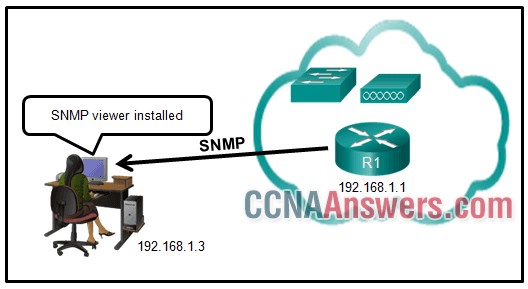
The snmp-server community command needs to include the rw keyword.
The snmp-server enable traps command is missing.
The snmp-server location command is missing.
There is a problem with the ACL configuration.
5. Which statement describes SNMP operation?
A set request is used by the NMS to change configuration variables in the agent device.
An SNMP agent that resides on a managed device collects information about the device and stores that information remotely in the MIB that is located on the NMS.
An NMS periodically polls the SNMP agents that are residing on managed devices by using traps to query the devices for data.
A get request is used by the SNMP agent to query the device for data.
6. A network administrator issues two commands on a router:
R1(config)# snmp-server host 10.10.50.25 version 2c campus
R1(config)# snmp-server enable traps
What can be concluded after the commands are entered?
If an interface comes up, a trap is sent to the server.
Traps are sent with the source IP address as 10.10.50.25.
No traps are sent, because the notification-types argument was not specified yet.
The snmp-server enable traps command needs to be used repeatedly if a particular subset of trap types is desired.
7. A network administrator has issued the snmp-server user admin1 admin v3 encrypted auth md5 abc789 priv des 256 key99 command. What are two features of this command? (Choose two.)
It allows a network administrator to configure a secret encrypted password on the SNMP server.
It adds a new user to the SNMP group.
It restricts SNMP access to defined SNMP managers.
It forces the network manager to log into the agent to retrieve the SNMP messages.
It uses the MD5 authentication of the SNMP messages.
8. Refer to the exhibit. Based on the output generated by the show monitor session 1 command, how will SPAN operate on the switch?
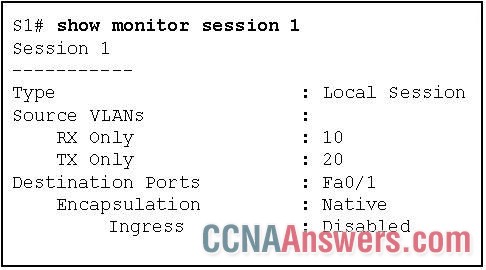
Native VLAN traffic transmitted from VLAN 10 or received on VLAN 20 is forwarded to FastEthernet 0/1.
All traffic transmitted from VLAN 10 or received on VLAN 20 is forwarded to FastEthernet 0/1.
Native VLAN traffic received on VLAN 10 or transmitted from VLAN 20 is forwarded to FastEthernet 0/1.
All traffic received on VLAN 10 or transmitted from VLAN 20 is forwarded to FastEthernet 0/1.
9. A network administrator is analyzing the features supported by the multiple versions of SNMP. What are two features that are supported by SNMPv3 but not by SNMPv1 or SNMPv2c? (Choose two.)
bulk retrieval of MIB information
message source validation
message encryption
SNMP trap mechanism
community-based security
10. What is a drawback of the local database method of securing device access that can be solved by using AAA with centralized servers?
It is very susceptible to brute-force attacks because there is no username.
User accounts must be configured locally on each device, which is an unscalable authentication solution.
There is no ability to provide accountability.
The passwords can only be stored in plain text in the running configuration.
11. Which two protocols are used to provide server-based AAA authentication? (Choose two.)
802.1x
SSH
RADIUS
SNMP
TACACS+
12. The exhibit shows a network topology. On the top, there are two routers, labeled R1 and R2. Under the two routers, there are two Layer 3 switches, labeled DS1 and DS2, . Under DS1 and DS2, there are three Layer 2 switches, labeled AS1, AS2, and AS3. Both R1 and R2 have two connections, one to DS1 and another to DS2. DS1 and DS2 each has three connections, one to AS1, one to AS2, and one to AS3. PC1 is connected on switch AS1 and PC2 is connected to switch AS2. There is a DHCP server connected on switch AS3.Refer to the exhibit. PC1 and PC2 should be able to obtain IP address assignments from the DHCP server. How many ports among switches should be assigned as trusted ports as part of the DHCP snooping configuration?
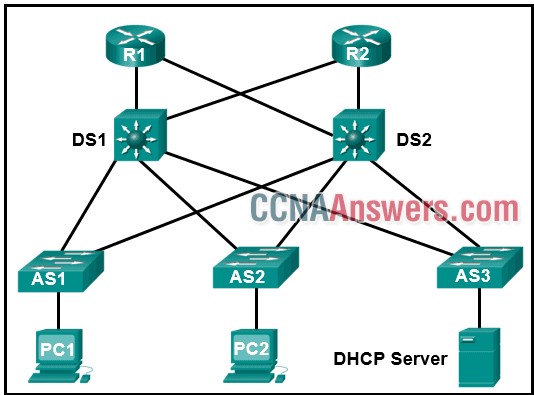
3
1
5
7
13. Which statement describes the RSPAN VLAN?
The RSPAN VLAN must be the same as the native VLAN.
The RSPAN VLAN can be used for remote management of network switches.
The RSPAN VLAN can be used to carry secure traffic between switches.
The RSPAN VLAN must be the same on both the source and destination switch.
14. What protocol is used to encapsulate the EAP data between the authenticator and authentication server performing 802.1X authentication?
TACACS+
MD5
RADIUS
SSH
15. What are three techniques for mitigating VLAN attacks? (Choose three.)
Enable trunking manually.
Set the native VLAN to an unused VLAN.
Disable DTP.
Use private VLANs.
Enable BPDU guard.
Enable Source Guard.
16. The exhibit shows a network consisting of a router, two switches, a DHCP client host, an attacker host, and a DHCP server. Switch S1 shows four interface connections: G0/1 to the DHCP client, G0/22 to switch S2, G0/24 to router R1, and G0/23 to the DHCP server. The attacker host is connected to switch S2.Refer to the exhibit. Which interface on switch S1 should be configured as a DHCP snooping trusted port to help mitigate DHCP spoofing attacks?
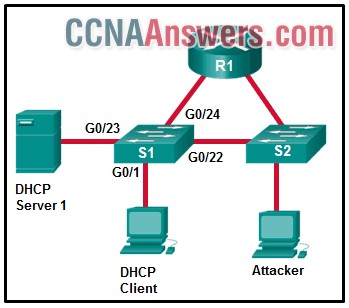
G0/24
G0/23
G0/22
G0/1
17. Refer to the exhibit. What can be concluded from the produced output?
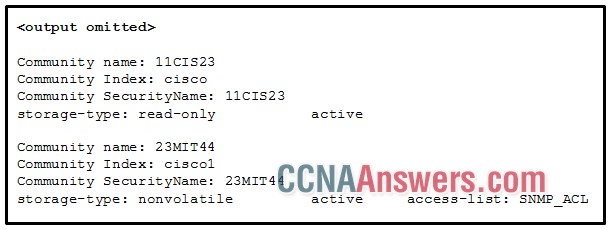
An ACL was configured to restrict SNMP access to an SNMP manager.
The location of the device was not configured with the snmp-server location command.
The system contact was not configured with the snmp-server contact command.
This is the output of the show snmp command without any parameters.
18. What network attack seeks to create a DoS for clients by preventing them from being able to obtain a DHCP lease?
DHCP spoofing
IP address spoofing
DHCP starvation
CAM table attack
19. Which protocol or service can be configured to send unsolicited messages to alert the network administrator about a network event such as an extremely high CPU utilization on a router?
NetFlow
NTP
SNMP
syslog
20. Refer to the exhibit. Which command or set of commands will configure SW_A to copy all traffic for the server to the packet analyzer?
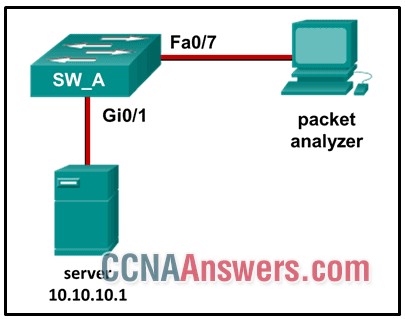
Sw_A(config)# monitor session 5 source interface gi0/1
Sw_A(config)# monitor session 5 destination interface fa0/7
Sw_A(config)# monitor session 5 source interface gi0/1
Sw_A(config)# monitor session 6 destination interface fa0/7
Sw_A(config)# monitor session 1 destination interface fa0/7
Sw_A(config)# monitor session 1 destination interface gi0/1
Sw_A(config)# monitor session 1 source interface fa0/1
Sw_A(config)# monitor session 1 source interface fa0/7
21. What are SNMP trap messages?
Messages that are sent periodically by the NMS to the SNMP agents that reside on managed devices to query the device for data
messages that are used by the NMS to query the device for data
messages that are used by the NMS to change configuration variables in the agent device
unsolicited messages that are sent by the SNMP agent and alert the NMS to a condition on the network
22. Refer to the exhibit. A SNMP manager has IP address 172.16.1.120. The SNMP manager is unable to change configuration variables on the R1 SNMP agent. What could be the problem?

The IP address of the SNMP manager must be 172.16.1.1.
The SNMP agent should have traps disabled.
The ACL of ACL_SNMP has not been implemented on an interface yet.
The SNMP agent is not configured for write access.
23. What is the behavior of a switch as a result of a successful CAM table attack?
The switch will shut down.
The switch will drop all received frames.
The switch interfaces will transition to the error-disabled state.
The switch will forward all received frames to all other ports.
24. When using 802.1X authentication, what device controls physical access to the network, based on the authentication status of the client?
the supplicant
the authentication server
the switch that the client is connected to
the router that is serving as the default gateway
25. What is the function of the MIB element as part of a network management system?
to collect data from SNMP agents
to send and retrieve network management information
to store data about a device
to change configurations on SNMP agents
26. Which SNMP version uses weak community string-based access control and supports bulk retrieval?
SNMPv3
SNMPv2c
SNMPv1
SNMPv2Classic


Leave a Reply